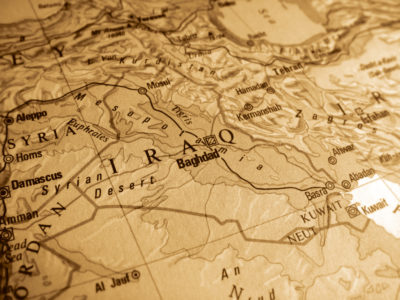A nation must think before it acts.

Each week during the summer, FPRI holds a seminar exclusively for its interns. On June 23, Samuel Helfont, a Senior Fellow in the Program on the Middle East at FPRI and a full-time lecturer at the University of Pennsylvania, delivered the second talk on the Iraq Wars.
Dr. Samuel Helfont started his lecture by highlighting how odd it is that Iraq has been such a central part of U.S. foreign policy for over 25 years. Iraq on the surface, according to Helfont, is not a particularly unique country. Among all countries, it is 39th in terms of population and 36th economically. Despite its unassuming position in global rankings, the United States has diverted more money to Iraq than to any other foreign country in the last quarter century. Why is Iraq the center of U.S. policy given its seemingly insignificant status among nations?
In order to fully understand this puzzle, Helfont began his explanation with a history of Iraq, first giving a brief description of the regional ethnic and religious divisions, and then the disputed narrative of Iraq as a country drawn up by Imperial Britain. Helfont argued that this narrative of Iraq as a victim of colonialism is mostly wrong. Iraq’s borders were based on treaties and wars in a manner not completely different from the way European countries were formed. The incorrect narrative of Iraq’s formation is useful to two groups: the people of imperialist nations and Arab leaders. Imperialists would like to take credit for the creation of a nation, while Arab leaders would like to use former imperialist control as a scapegoat for the current problems in the Middle East.
Helfont then continued his history of Iraq, starting with its transition to a sovereign nation in the early 1930s, followed by a series of coups by the military, which consisted of kicking out the current government while retaining the Iraqi monarch. Then, Iraq transitioned to a military dictatorship when one coup removed the monarch along with the government. During this period, Ba’thism, an ideology promoting both nationalist and socialist ideas, rose to prominence in Iraq. In 1968, the Ba’thists were able to permanently gain power and erected General Ahmed Hassan al-Bakr as the president and prime minister of Iraq. It was during this time that Saddam Hussein began to play a role in the Iraqi government. Helfont described Saddam as working behind the scenes as a strongman under al-Bakr. In 1979, Saddam executed a bloodless coup to become the new president and prime minister of Iraq. As leader, Saddam strategically used international tensions to further his own agenda. He was able to get support from the United States during Iraq’s eight-year war with Iran by threatening to ask for help from the Soviet Union. The United States helped Iraq by blowing up Iranian ships that were targeting Kuwaiti tankers transporting oil for Iraq. Helfont then highlighted a later setback for Saddam, which occurred when Iraq invaded Kuwait following accusations that Kuwait refused to forgive loans it made to Iraq as well as allegedly stealing Iraq’s oil. Saddam expected the United States to leave Iraq alone in its conquest of Kuwait because Russia could come to Iraq’s aid, potentially starting World War III. However, Saddam was not aware that Russia was abandoning its Cold War policy, and had not been protecting foreign allies as closely as before. Thus, following Iraq’s invasion of Kuwait, the United States organized a coalition force to defend Kuwait from the Iraqis, dealing Saddam a resounding political and military defeat. Following the Kuwait invasion, the United States imposed economic sanctions on Iraq. Helfont explained that these sanctions were meant to trigger reform, but instead resulted in economic devastation due to Saddam’s stubborn character. Many Iraqis starved through the 1990s.
Helfont moved onto Saddam’s true downfall, which took place after the terrorist attacks on September 11, 2001. Before 9/11, Saddam was working to reduce the economic sanctions by bargaining with Iraqi oil, but 9/11 changed U.S. feelings about leaders acting inappropriately in the international system. This change was especially true for leaders with connections to terrorism and possible weapons of mass destruction, of which the U.S incorrectly suspected Saddam. Thus, following 9/11, the United States deposed Saddam and his Ba’thist government. Unfortunately, after doing so, the elections for a transitional government did not have proportional Sunni representation, leading to a Shia-led coalition taking control of the government with the support of Iran, and alienating Sunnis. Helfont stated that this set up, in turn, led to the problems that Iraq, and even Syria, currently face today, including the rise of the Islamic State of Iraq and Syria (ISIS), and the Syrian Civil War. Now, the Iraqi conflict is deep and nearly unsolvable. Many Sunnis hate Shia and Iranian involvement in Iraqi government so much that they would rather support ISIS. Following this logic, Helfont argues that the defeat of ISIS will most likely not signal the end of Sunni terrorism in Iraq. According to Helfont, we will probably see something similar to ISIS soon.




